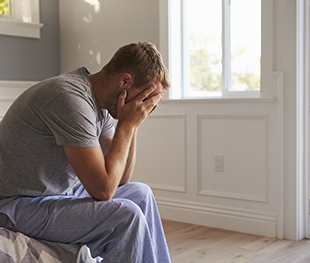Postpartum depression has been getting some well-deserved attention lately thanks to celebrities like Chrissy Teigen who have opened up about their personal struggles with the affliction. Yet, most people do not realize that fathers can also struggle with postpartum depression.
It is estimated that around 10 percent of men report symptoms of depression following the birth of a child – that rate is double the normal rate of depression among men. While it is known that hormonal changes are to blame for postpartum depression in women, the cause for it in men has been widely unknown. But, a recent study conducted by psychologists Darby Saxbe and Robin Edelstein reveal that male testosterone may have something to do with it. They found that men’s testosterone levels dropped throughout the course of their partner’s pregnancy and of data analyzed, the men with the lowest levels of the hormone had the highest levels of depression.
Lower testosterone in men has been linked to higher rates of depression for some time. So much so that many psychiatrists have considered prescribing testosterone supplements to their depressed male patients. The link between testosterone and male postpartum depression has not been specifically studied but these findings seem to be pointing to a clear correlation.
Surprisingly, they noted a positive effect on the men’s partners. Women with low-testosterone partners reported higher relationship satisfaction and lower depression rates. Women with low-testosterone partners also reported experiencing less aggressive behaviour, such as physical or verbal violence, from their partners. Testosterone is associated with aggressive and typically masculine behaviour. Further, men with high testosterone levels reported feeling high levels of stress due to parenthood demands.
So, there are two sides to the table; men who have low levels of testosterone are at a higher risk of postpartum depression but men with high testosterone levels are at risk of having more parenting stress and less happy partners.
It may make sense for a man’s testosterone levels to drop when they have a baby – it allows them to invest more time and effort into their relationships with their child and partner. But, this is at the cost of being more susceptible to mood disorders such as depression. So, it turns out new Moms and Dads can take comfort in the fact that their postpartum emotions are completely normal and may actually have an evolutionary role to play.
At the end of the day, if you are suffering from postpartum depression for any reason at all, it is important that you find someone to talk to and that can help. Starting a family should be a time in your life filled with love – don’t let complicated hormones ruin those memories for you.









